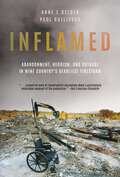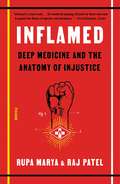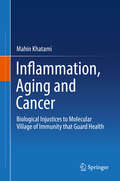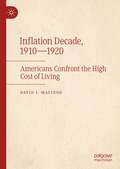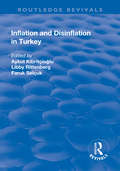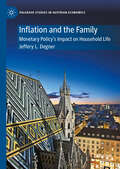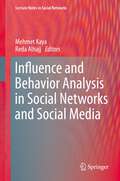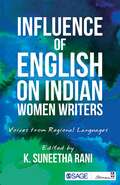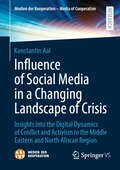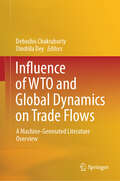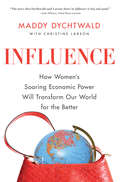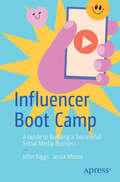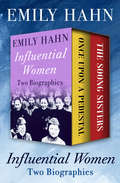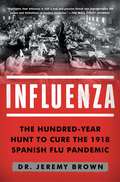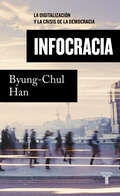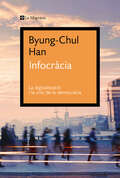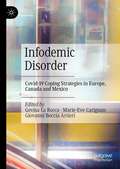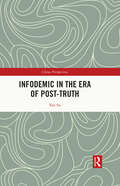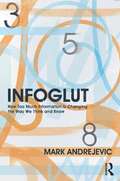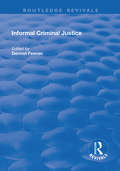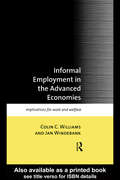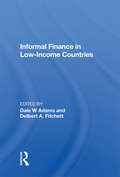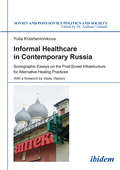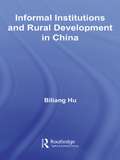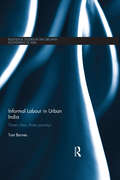- Table View
- List View
Inflamed: Abandonment, Heroism, and Outrage in Wine Country's Deadliest Firestorm
by Anne E. Belden Paul GullixsonThe dramatic story of hundreds of senior citizens left in the path of a ferocious firestorm and what the quest for accountability reveals about the increasing risks to our most vulnerable population. &“…a powerful work of investigative journalism about a particularly vulnerable segment of the population…. Alongside an engrossing account of the emergency as it unfolded in Sonoma County, Belden and Gullixson provide a definitive account of management&’s woefully inadequate response at the two sister facilities. Their findings are a lesson to other care facilities —here&’s what not to do.&” —San Francisco ChronicleJust after midnight on October 9, 2017, as one of the nation&’s deadliest and most destructive firestorms swept over California&’s Wine Country, hundreds of elderly residents from two posh senior living facilities were caught in its path. The frailest were blind, in wheelchairs, or diagnosed with dementia, and their community quickly transformed from a palatial complex that pledged to care for them to one that threatened to entomb them. The rescue of the final 105 seniors left behind on an inflamed hillside depended not on employees, but strangers whose lives intersected in a riveting tale of terror and heroism. Headlines blamed caregivers for abandonment and neglect, but the truth proved far more complex—leading to a battle for accountability that stretched from the courtroom to the state legislature, and ultimately, to the ballot box. Inflamed: Abandonment, Heroism, and Outrage in Wine Country&’s Deadliest Firestorm is the gripping and emotional narrative detailing what happened to these seniors, employees, and rescuers before, during, and after the Tubbs Fire decimated portions of Santa Rosa, including Oakmont Senior Living Villa Capri and part of Varenna at Fountaingrove. Anne Belden and Paul Gullixson are professional journalists and Sonoma County residents who spent three years recording each phase of the disaster in agonizing detail—from the botched evacuation and its excruciating aftermath to the investigations, lawsuits, and breakdowns that followed. They tell this harrowing story with a veracity and compassion only achieved by experienced reporters with local roots. Their narrative revisits the horrors of 2017 but also asks the reader to look to the future and consider how their community&’s most vulnerable will fare as ten thousand Baby Boomers retire each day, the for-profit assisted living industry rapidly expands, and the climate becomes more volatile. If this travesty can happen at high-end senior living complexes, it can happen anywhere.
Inflamed: Deep Medicine and the Anatomy of Injustice
by Raj Patel Rupa MaryaRaj Patel, the New York Times bestselling author of The Value of Nothing, teams up with physician, activist, and co-founder of the Do No Harm Coalition Rupa Marya to reveal the links between health and structural injustices--and to offer a new deep medicine that can heal our bodies and our world.The Covid pandemic and the shocking racial disparities in its impact. The surge in inflammatory illnesses such as gastrointestinal disorders and asthma. Mass uprisings around the world in response to systemic racism and violence. Rising numbers of climate refugees. Our bodies, societies, and planet are inflamed.Boldly original, Inflamed takes us on a medical tour through the human body—our digestive, endocrine, circulatory, respiratory, reproductive, immune, and nervous systems. Unlike a traditional anatomy book, this groundbreaking work illuminates the hidden relationships between our biological systems and the profound injustices of our political and economic systems. Inflammation is connected to the food we eat, the air we breathe, and the diversity of the microbes living inside us, which regulate everything from our brain’s development to our immune system’s functioning. It’s connected to the number of traumatic events we experienced as children and to the traumas endured by our ancestors. It’s connected not only to access to health care but to the very models of health that physicians practice.Raj Patel, the renowned political economist and New York Times bestselling author of The Value of Nothing, teams up with the physician Rupa Marya to offer a radical new cure: the deep medicine of decolonization. Decolonizing heals what has been divided, reestablishing our relationships with the Earth and one another. Combining the latest scientific research and scholarship on globalization with the stories of Marya’s work with patients in marginalized communities, activist passion, and the wisdom of Indigenous groups, Inflamed points the way toward a deep medicine that has the potential to heal not only our bodies, but the world.
Inflammation, Aging and Cancer
by Mahin KhatamiThis book was prepared as extension of author's accidental discoveries on experimental models of acute and chronic ocular inflammatory diseases that were established at the University of Pennsylvania in 1980's. Analyses of original data suggest a series of first evidence for direct link between inflammation and developmental phases of immune dysfunction in multistep tumorigenesis and angiogenesis. The only evidence presented on initial events for interactions and synergies between activated host and recruiting cells toward tumorigenesis. Effective immunity was defined as balance between two highly regulated and biologically opposing arms, Yin and Yang of acute inflammation, an amazingly precise signal communications between immune and non-immune systems requiring differential bioenergetics. Unresolved inflammation is a common denominator mapping aging process and induction of 'mild', 'moderate' or 'severe' immune disorders including cancers. Our knowledge of the fascinating biology of immunity in health or chronic diseases is fragmentary, chaotic and confusing, particularly for cancer science. Lack of progress in curing majority of chronic diseases or cancer is primarily due to the fact that scientists work on isolated molecules/cells or topics that are funded and promoted by decision makers in medical/cancer establishment. Despite existence of over 25 million articles on cancer-related topics, cancer biology and cure remain mysteries to be solved. After a century of cancer research, the failure rates of therapies for solid tumors are 90% (+/-5). Current reductionist views on cancer science are irresponsible, shut-gun approaches and create chaos. Outcomes are loss of millions of precious lives and economic drain to society. Very little is known about initial events that disturb effective immunity whose function is to monitor and arrest growth of cancerous cells or defend against other external or internal hazardous agents that threaten body's survival. The author demonstrates the serious need for systematic understanding of how immune disruptors and aging process would alter effective immunity. Outcomes of proposed orderly studies are expected to provide logical foundations for cost-effective strategies to promote immunity toward a healthier society. The policy makers and medical/cancer establishment are urged to return to the common sense that our Forefathers used to serve the public.
Inflation Decade, 1910—1920: Americans Confront the High Cost of Living
by David I. MacleodThis book shows how inflation can disrupt politics and society. With no recent precedent, mild inflation spurred mass protests, myriad remedial schemes, and partisan political reversals between 1910 and 1914. Then wartime demand and inflationary fiscal policy doubled consumer prices from 1915 to 1920, triggering waves of strikes, food riots by immigrant housewives, class conflict, and elite fears of revolution. Middle-class households resented falling real incomes. Even more than today, food prices dominated consumer concerns. Yet farmers wanted high commodity prices. Accordingly, both sides blamed and attacked meatpackers, wholesalers, and retailers. Then as now, inflation hurt whichever party held the White House. Fumbling responses by Wilson’s administration and the Federal Reserve led to hesitant price controls, punitive raids and prosecutions, and a now-familiar fallback—high interest rates in 1920 and subsequent recession. An epilogue traces continuing popular and politicalresponses to changes in the consumer price index down to 2020.
Inflation and Disinflation in Turkey (Routledge Revivals)
by Libby Rittenberg Aykut Kibritçioǧlu Faruk SelçukThis title was first published in 2002. Since the 1990s Turkey has experienced a number of disasters, both physical and economic. The result has been a decrease in economic performance compared to other European states. This study addresses the country's ongoing economic struggles.
Inflation and the Family: Monetary Policy's Impact on Household Life (Palgrave Studies in Austrian Economics)
by Jeffery L. DegnerThis book provides unique insight into the relationship between economics and family life. Taking ideas from the Austrian school of economics’ understanding of monetary theory, it delves into the drivers of family formation, fertility, and family disintegration, with a particular focus on the role of inflation and inflationary policy. By placing questions surrounding family life within a political economy setting, the impact of relative price changes, inflation culture, and specific monetary policies on the role and structure of the family are highlighted. This book offers a nuanced and robust understanding of the economic causes of the deinstitutionalization of traditional family life. It will be relevant to students and researchers interested in monetary economics and the economics of the family.
Influence and Behavior Analysis in Social Networks and Social Media (Lecture Notes in Social Networks)
by Reda Alhajj Mehmet KayaThis timely book focuses on influence and behavior analysis in the broader context of social network applications and social media. Twitter accounts of telecommunications companies are analyzed. Rumor sources in finite graphs with boundary effects by message-passing algorithms are identified.The coherent, state-of-the-art collection of chapters was initially selected based on solid reviews from the IEEE/ACM International Conference on Advances in Social Networks, Analysis, and Mining (ASONAM '17). Chapters were then improved and extended substantially, and the final versions were rigorously reviewed and revised to meet the series standards. Original chapters coming from outside of the meeting round out the coverage. The result will appeal to researchers and students working in social network and social media analysis.
Influence of English on Indian Women Writers: Voices from Regional Languages
by K. Suneetha RaniThis book reveals English as culture, politics, lifestyle and social change in the context of Indian women. English as a symbol of modernity in India was first accessed by men, giving them a new image of masculinity while Indian languages were ‘feminized’—seen as meant for women. Among upper-caste women, English was a vehicle for social reform and for lessening seclusion, invisibility and economic dependence. For the so-called lower castes, the language was aspirational, indicating emancipation and empowerment possibilities, and threatening upper-caste dominance. English formed its own language of gender and made women’s voices stronger in regional languages, which can be seen in the flowering of women’s articles, fiction, biography and letters. This book records the different ways in which women responded to the coming of English into their lives.
Influence of Social Media in a Changing Landscape of Crisis: Insights into the Digital Dynamics of Conflict and Activism in the Middle Eastern and North African Region (Medien der Kooperation – Media of Cooperation)
by Konstantin AalSocial media and information and communication technologies (ICTs) have played a pivotal role in various conflicts around the world, including the Arab Spring in Tunisia, the war in Syria, Palestinian activism, and the recent protests in Iran. This book examines the use and impact of ICT and social media in these conflicts, focusing on countries in the MENA region. The research takes an on-the-ground approach, working closely with local people to understand their everyday use and appropriation of social media and ICT. The author presents four studies covering different aspects of social media use in conflict: the evolution of the media landscape in post-uprising Tunisia; Palestinian activists using social media to oppose the construction of the wall; the role of social media among Syrian Free Army fighters, activists and refugees; and young Iranians' strategies for circumventing internet restrictions. These studies reveal the ways in which social media and conflict intersect. The research assesses the impact of social media in these settings, considering the historical, socio-economic and socio-technical dynamics of the regions. Finally, the dissertation critically reflects on the methods used in this fieldwork, emphasizing the role of the researcher and personal biases.
Influence of WTO and Global Dynamics on Trade Flows: A Machine-Generated Literature Overview
by Debashis Chakraborty Oindrila DeyThis book is a machine-generated literature overview that explores the impact of the World Trade Organization (WTO) on international trade and its development. It looks at international trade before and after 1995 when WTO was established. It highlights the journey of the reciprocity-based reforms under WTO that were expected to help the developing and less developed countries (LDCs) more vis-à-vis their developed counterparts, given the existence of systemic and structural bottlenecks in the latter territories. The enabling steps were further expected to promote exports from developing countries and LDCs in line with their comparative advantage patterns, enhance the wage level and in turn, facilitate development of local population. The book showcases how during the first decade after WTO inception, a considerable progress was made for facilitating exports from the lower and lower-middle income countries through crucial provisions like less than full reciprocity (LTFR), Generalized System of Preferences (GSP), support measures under Aid for Trade, zero duty preferences under Special and Differential Treatment (SDT) and so on. However, the pace of WTO reforms has slowed down in the aftermath of the sub-prime crisis in 2008-09 and subsequent focus on formation of regional trade agreements (RTAs). In particular, in the aftermath of Covid-19, a trend towards de-globalization has been noticed, with considerable ramifications for the development of lower-income countries. In this background, there is a need to analyze how the deepening of trade flows and the subsequent de-globalization waves in the global canvas have traversed different paths in different continents and draw the appropriate lessons for the understanding the trade-development interlinkage therein. With insightful observations from the human editors, this machine-generated overview would be of interest to academicians, policy research community, advisory research community, and students ofinternational trade globally.^
Influence: How Women's Soaring Economic Power Will Transform Our World for the Better
by Maddy DychtwaldIn the United States and in very many nations around the world, women are on the cusp of new financial power--and evidence suggests that women will use this power to improve society in ways we can only begin to imagine. Through candid interviews and lively reporting, and with exclusive research, Dychtwald reveals a huge cultural transformation that is about to occur--a true tipping point--after which more children may have quality health care and education, workplaces may be more responsive to families, men may experience new freedoms and opportunities to pursue more meaningful careers, and more corporations and nations will be led by women, and they will thrive.Dychtwald and Larson give us a sneak peek at the world turned right-side-up by women. To read this book is to prepare oneself for an altered--and improved--way of life.
Influencer Boot Camp: A Guide to Building a Successful Social Media Business
by John Biggs Jessa MooreLearn how to leverage your own social media through techniques used by influencer agencies and successful digital marketers. Influencer marketing can amplify word of mouth and reputation to energize your own community. This book traces the history of influencer marketing, highlighting key milestones and shifts in consumer preferences. It guides readers on discovering their unique niche within the influencer space, emphasizing the importance of authenticity and passion. It shows you strategies for developing a strong personal brand that resonates with your target audience and sets you apart from competitors. It shares practical tips and techniques for creating compelling content across various platforms, including visual storytelling, copywriting, and video production. Through this book, you will learn techniques to communicate your story, manage your reputation, and grow your own influence.
Influential Women: Two Biographies
by Emily HahnPortraits of pivotal American feminists and three of the most powerful women in twentieth-century China by the &“quintessential New Yorker narrator&” (The New York Times). Once Upon a Pedestal: After living an unconventional and exotic life for decades, New Yorker writer Emily Hahn was in her late sixties when this book was first published in 1974. As the Women&’s Movement continued to gain momentum, Hahn penned this &“essential history of the remarkable women who led the feminist movement in America.&” Her &“excellent and eminently readable&” biographical sketches include Susan B. Anthony, Clara Barton, Fanny Wright, the Grimké sisters, Margaret Sanger, Jane Addams, Victoria Woodhull, Harriet Martineau, Eleanor Roosevelt, and Betty Friedan (Publishers Weekly). &“[The] quintessential New Yorker narrator whose adventures over the last forty years have intrigued, amused and educated . . . Emily Hahn is, herself, a role model. It is fitting and felicitous for her to give us an armchair guide to strong-minded American women.&” —The New York Times The Soong Sisters: In 1935, intrepid journalist and fearless feminist Emily Hahn traveled to China and sent dispatches to the New Yorker. Through her lover, the Chinese poet Shao Xunmei, she met and established close bonds with three of the most instrumental women in twentieth-century Chinese history, who happened to be sisters. The Soong family was arguably the most influential family in Shanghai, even more so as eldest sister Eling married finance minister H. H. Kung; middle sister Chingling married Sun Yat-Sen, the founding father and first president of the Republic of China; and youngest sister Mayling married Chiang Kai-Shek, who succeeded Sun as the leader of the Republic of China. Hahn&’s chronicle of the family&’s history, written while bombs were falling during the Second Sino-Japanese War, and published in 1941, while Hahn was still in Japanese-occupied Hong Kong, is a vivid, comprehensive, and uniquely personal account of the sisters who would become known to the world as Madame Kung, Madame Sun, and Madame Chiang Kai-Shek. &“First rate reportorial job on three distinguished women . . . [a] tribute to their work and their individual heroisms.&” —Kirkus Reviews
Influenza: The Hundred Year Hunt to Cure the Deadliest Disease in History
by Jeremy BrownOn the 100th anniversary of the devastating pandemic of 1918, Jeremy Brown, a veteran ER doctor, explores the troubling, terrifying, and complex history of the flu virus, from the origins of the Great Flu that killed millions, to vexing questions such as: are we prepared for the next epidemic, should you get a flu shot, and how close are we to finding a cure? <P><P>While influenza is now often thought of as a common and mild disease, it still kills over 30,000 people in the US each year. Dr. Jeremy Brown, currently Director of Emergency Care Research at the National Institutes of Health, expounds on the flu's deadly past to solve the mysteries that could protect us from the next outbreak. <P><P>In Influenza, he talks with leading epidemiologists, policy makers, and the researcher who first sequenced the genetic building blocks of the original 1918 virus to offer both a comprehensive history and a roadmap for understanding what’s to come. Dr. Brown digs into the discovery and resurrection of the flu virus in the frozen victims of the 1918 epidemic, as well as the bizarre remedies that once treated the disease, such as whiskey and blood-letting. \ <P><P>Influenza also breaks down the current dialogue surrounding the disease, explaining the controversy over vaccinations, antiviral drugs like Tamiflu, and the federal government’s role in preparing for pandemic outbreaks. Though 100 years of advancement in medical research and technology have passed since the 1918 disaster, Dr. Brown warns that many of the most vital questions about the flu virus continue to confound even the leading experts. <P><P>Influenza is an enlightening and unnerving look at a shapeshifting deadly virus that has been around long before people—and warns us that it may be many more years before we are able to conquer it for good.
Infocracia: La digitalización y la crisis de la democracia
by Byung-Chul HanUn análisis sagaz del régimen de la información, el nuevo gobierno al que estamos sometidos, por el filósofo más leído del siglo XXI. La digitalización avanza inexorablemente. Aturdidos por el frenesí de la comunicación y la información, nos sentimos impotentes ante el tsunami de datos que despliega fuerzas destructivas y deformantes. Hoy la digitalización también afecta a la esfera política y provoca graves trastornos en el proceso democrático. Las campañas electorales son guerras de información que se libran con todos los medios técnicos y psicológicos imaginables. Los bots -las cuentas falsas automatizadas en las redes sociales- difunden noticias falsas y discursos de odio e influyen en la formación de la opinión pública. Los ejércitos de trolls intervienen en las campañas apuntalando la desinformación. Las teorías de la conspiración y la propaganda dominan el debate político. Por medio de la psicometría y la psicopolítica digital, se intenta influir en el comportamiento electoral y evitar las decisiones conscientes. El nuevo ensayo de Byung-Chul Han describe la crisis de la democracia y la atribuye al cambio estructural de la esfera pública en el mundo digital. También le da un nombre a este fenómeno: infocracia.
Infocràcia: La digitalització i la crisi de la democràcia
by Byung-Chul HanUna anàlisi sagaç del règim de la informació, el nou govern a què estem sotmesos, pel filòsof més llegit del segle XXI. La digitalització avança inexorablement. Atordits pel frenesí de la comunicació i la informació, ens sentim impotents davant del tsunami de dades que desplega forces destructives i deformants. La digitalització també afecta l'esfera política i provoca greus trastorns en el procés democràtic. Les campanyes electorals són guerres dinformació que es lliuren amb tots els mitjans tècnics i psicològics imaginables.Els bots —els comptes falsos automatitzats a les xarxes socials— difonen notícies falses i discursos d'odi i influeixen en la formació de l'opinió pública. Els exèrcits de trolls intervenen en les campanyes apuntalant la desinformació. Les teories de la conspiració i la propaganda dominen el debat polític. Per mitjà de la psicometria i la psicopolítica digital s'intenta influir en el comportament electoral i evitar les decisions conscients. El nou assaig de Byung-Chul Han descriu la crisi de la democràcia i l'atribueix al canvi estructural de l'esfera pública al món digital. També dóna un nom a aquest fenomen: infocràcia.
Infodemic Disorder: Covid-19 Coping Strategies in Europe, Canada and Mexico
by Gevisa La Rocca Marie-Eve Carignan Giovanni Boccia ArtieriThis contributed volume identifies how the information processes of public institutions and citizens have changed throughout the COVID-19 pandemic, within a new context that emerged: the infodemic disorder. Public debate is largely characterized today by a crisis of the legitimacy of institutions, accompanied by a crisis of authority in public communication, leading to the emergency of a state of information disorder due specifically to the need to find information related to the coping of the pandemic. This condition is characterized by growing attention to issues related to ‘fake news’, ‘misinformation’, and ‘media manipulation’, that are intertwined in digital platform ecosystems, and the effects of which on democracy, public communication and research, and the sharing of information in the civic sphere are broad and far-reaching. This volume analyzes the links between communication strategies of public institutions, and the resulting citizen communication, in an attempt to tease out how communication processes have changed during the pandemic. It was decided to investigate this infodemic disorder as it appeared in three different geographical contexts: Europe, Canada and Mexico and, at the same time, to bring out the formal and informal coping strategies implemented by public institutions and citizens. Beginning with an introduction to the crisis of information created by the pandemic, the contributors build a theoretical framework, provide contagion data, and subsequently, for each of the geographical contexts analyzed, explore the public communication strategies and those activated by citizens seeking to share information.
Infodemic in the Era of Post-Truth (China Perspectives)
by Yan SuWith the revolution in information technology, concerns about the proliferation of false, unverified, and misleading information have been growing. As one of the severe public health crises in modern history, the COVID-19 pandemic has provided a novel context for the "post-truth" research. In a "post-truth" era, people are no longer interested in investigating objective facts, but tend to curl up in echo chambers and resonate with like-minded others. Against this backdrop, this book (1) systematically conceptualises "post-truth" and analyzes its defining characteristics and driving forces, (2) examines the nuanced effects of information sources and news consumption behaviours and strategies on COVID-19 misperceptions and knowledge, (3) explores the role of social media in shaping COVID-19-related misperceptions and knowledge, and (4) highlights the importance of news media literacy in navigating the "post-truth" era. The book will be essential reading for students and scholars of media and film studies, communication studies and comparative studies. It will also be a useful reference for medical and media professionals such as doctors, nurses and journalists.
Infoglut: How Too Much Information Is Changing the Way We Think and Know
by Mark AndrejevicToday, more mediated information is available to more people than at any other time in human history. New and revitalized sense-making strategies multiply in response to the challenges of "cutting through the clutter" of competing narratives and taming the avalanche of information. Data miners, "sentiment analysts," and decision markets offer to help bodies of data "speak for themselves"—making sense of their own patterns so we don’t have to. Neuromarketers and body language experts promise to peer behind people’s words to see what their brains are really thinking and feeling. New forms of information processing promise to displace the need for expertise and even comprehension—at least for those with access to the data. Infoglut explores the connections between these wide-ranging sense-making strategies for an era of information overload and "big data," and the new forms of control they enable. Andrejevic critiques the popular embrace of deconstructive debunkery, calling into question the post-truth, post-narrative, and post-comprehension politics it underwrites, and tracing a way beyond them.
Informal Criminal Justice (Routledge Revivals)
by Dermot FeenanThis title was first published in 2002: This volume explores conceptual debates and provides contemporary research in the field of informal criminal justice, including chapters on paramilitary "punishment" and post-cease-fire restorative justice schemes in Northern Ireland, post-apartheid vigilantism in South Africa, and informal crime management in England.
Informal Employment in Advanced Economies: Implications for Work and Welfare
by Colin C. Williams Jan WindebankRe-Placing Informal Employment challenges many of the popular myths surrounding informal economic activities, and offers a radical reassesment of their extent, growth, location and nature. The book uses case studies from the UK, France, Italy, the Netherlands, the US and Canada to challenge: * the popular belief that informal employment is growing throughout the advanced economies * the myth that this work is undertaken mostly by marginalized groups * the dominant view that we should replace informal with formal employment through enforcement of regulations. Examining policy options and their consequences, the authors show that conventional approaches only increase inequalities and that a radical alternative solution is essential.
Informal Finance In Low-income Countries
by Dale W Adams Delbert A. FitchettInvisible to official statistics and operating outside the reach of governmental regulation, informal finance markets often prove more efficient and more fair than their formal counterparts. The authors of these studies emphasize the diversity and richness of informal credit markets.
Informal Healthcare in Contemporary Russia: Sociographic Essays on the Post-Soviet Infrastructure for Alternative Healing Practices (Soviet and Post-Soviet Politics and Society #165)
by Yulia KrasheninnikovaThis volume deals with one of the most understudied aspects of everyday life in Russian society. Its main characters are the providers of goods and services to whom people turn for healthcare instead of official medical institutions. This encompasses a wide range of actors—from network marketing companies to 'folk' journals on health as well as healers, complementary medicine specialists, and religious organizations.Krasheninnikova's investigation pays particular attention to the legal, social, and economic status of informal healthcare providers. She demonstrates that these agents tend to flourish in bigger towns rather than in small settlements, where public healthcare is lacking. She also emphasizes the flexibility of boundaries between formal and informal healthcare due to the evolution of rules and regulations. The study reveals the important role of institutions that are generally not connected to alternative medicine, such as pharmacies, libraries, and church shops. This book is based on rich empirical observations and avoids both positive and critical assessment of the analyzed phenomena. The result is a vivid and thorough introduction to the world of self-medication and alternative healing in contemporary Russia.
Informal Institutions and Rural Development in China (Routledge Studies on the Chinese Economy)
by Biliang HuProviding an account of the role of informal institutions in Chinese rural development, this book, based on a decade of fieldwork of village life in the Chinese countryside, puts forth a distinctive argument on a very important topic in Chinese economic and social affairs. Focusing in particular on three major informal institutions: village trust and Rotating Savings and Credit Associations (ROSCAs), guanxi community and Integrating Village with Company (IVWC) governance, it argues that informal institutions, traditions and customs are all critical factors for facilitating modernization and social and economic development, promoting the integration of trust, reciprocity, responsibility and obligation into economic and social exchange processes and considerably lowering risks and transactions costs. This detailed account is an invaluable resource for postgraduates and researching studying and working in this area. Winner of the 2008 Zhang Peigang Development Economics Award.
Informal Labour in Urban India: Three Cities, Three Journeys (Routledge Studies in the Growth Economies of Asia)
by Tom BarnesDuring the last two decades, rapid economic growth and development in India has been based upon the mass employment of informal labour. Using case studies from three urban regions, this book examines this growth in modern India’s cities and towns. It argues that India has undergone a process of uneven and combined development during its integration with the world economy, leading to a distorted form of urban development. This book is about work and resistance in India’s massive ‘informal economy’. It looks at the growth of informal labour in Bangalore, Mumbai and New Delhi during an era of neoliberal economic policymaking. Going beyond mainstream accounts, it argues that India’s rapid economic development has been based upon the mass employment of workers on low wages who lack basic social protection and rights at work. It discusses how urban development in India is characterised by a combination of industrialisation, industrial relocation, restructuring and informalisation. Departing from some existing studies of de-industrialisation, it re-frames informalisation as a process that complements, rather than contradicts, contemporary industrialisation in rapidly-emerging economies. The book adopts a ‘classes of labour’ approach, classifying each case of informal labour as a specific ‘form of exploitation’: as a different way for employers to lower production costs, control workers and increase enterprise flexibility. Offering a critique of existing data on the measurement and monitoring of informal labour and employment, the book is relevant to students and scholars of Development Studies, International Political Economy and South Asian Studies.
